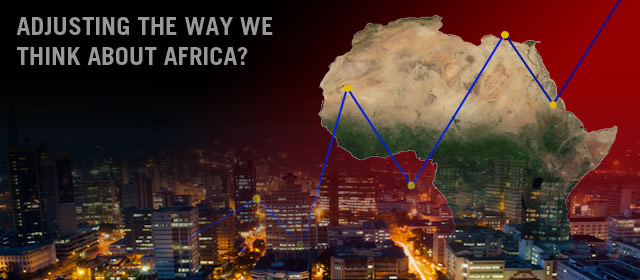 In a time of astonishing transformations, the hardest thing to adjust is the way we think.
In a time of astonishing transformations, the hardest thing to adjust is the way we think.
As John Maynard Keynes once responded to a critic, ‘when the facts change, I change my mind. What do you do?’
Europeans and Americans have a particular challenge with Africa in this regard. They have traditionally regarded it as a place lagging behind in development. I argue in Season of Rains: Africa in the World — now issued in paperback — that this idea originated in the days of the Atlantic slave trade and the powerful abolitionist movement that grew in opposition to it in the eighteenth century.
Quite simply, the idea of an Africa always in need of help is obsolete. Many African countries are forecasting economic growth rates over 5 percent. Portugal’s prime minister is soliciting financial help from his country’s former colony, Angola. The growth of a substantial middle class in countries such as Kenya, Nigeria and Ghana, in a continent that is home to over a billion people, is increasing both Africa’s strategic importance and its integration into consumer markets. The popular risings in North Africa remind the world that no political system lasts forever.
Quickest to appreciate some of the changes taking place has been the business world. Africa has become a favourite with the financial press, which often sees it as the world’s last emerging market. But much of the commentary in business journals and consultancy reports is focussed solely on growth rates and markets. It tends to ignore the deep-seated flaws that might put extraordinary demands on business relationships. The particular tunnel vision of hedge-fund managers risks turning Africa into a new investment bubble.
There is little reason to suppose that, even with high rates of economic growth, most African states will develop into the efficient managerial bureaucracies that so many outsiders would like to see. For all its economic dynamism, Africa remains home to many of the world’s ‘fragile’ states. Currently it hosts six of the United Nations’ fourteen peacekeeping missions. The alarming growth of Africa’s role in international criminal activity, such as the drug trade, should be cause for reflection.
So the challenge for analysts is to trace the characteristics of Africa’s emerging place in the world on the assumption that the classic paths of development are no longer relevant.
The reasons for the emergence of this curious mixture of economic growth and apparent political and governmental unreliability lie deep in Africa’s history.
Ever since its partition by the European concert of powers meeting at Berlin in 1884-5, Africa has had a particularly close relationship to multilateral organisations, such as the United Nations and the international financial institutions and, these days, the International Criminal Court. These multilateral institutions to some extent substitute for Africa’s own governmental shortcomings. If only for this reason, the quality of governance in Africa will continue to depend very much on the policies adopted by external powers. China has shown an unexpected interest in investing in the current multilateral structure that is so important to Africa, and is now the leading supplier of all the Security Council member-states of troops to UN peacekeeping missions. But there is no guarantee that at some future date China might not prefer to create its own system of alliances in a world where leading powers prefer to go it alone rather than invest in multilateralism.
In any event we are unlikely to see the growth of individual African countries as middle powers of the status of Brazil or India, not even in the case of South Africa. South Africa’s embrace by the BRICS group is rather misleading, for not only is South Africa’s economy far smaller than that of other members of that club, but all the signs are that the South African government is unravelling politically rather than consolidating as it gains experience. Under the presidency of Nelson Mandela, South Africa seemed the brightest star in the African sky, but it is now looking less brilliant as a result of the corruption and ineptitude of its ruling party.
It is most likely that we will see not the emergence of African middle powers but rather of states of limited political coherence that nevertheless contrive to sit atop dynamic economies. These are what Gérard Prunier, author of, inter alia, From Genocide to Continental War: The Congolese Conflict and the Crisis of Contemporary Africa, calls ‘successful failed states’.
Africa tends to exercise influence in international circuits through rather unconventional channels, including in the form of crime, migration, religion and many other aspects of globalisation that fall largely outside the sphere of classic diplomacy. In regard to religion, for example, Africa is rapidly becoming a leading centre of world Christianity and is of growing importance in the Muslim world as well. This is connected to the dynamism of African migrant communities, which now exist in some surprising places, such as the 100,000 Africans said to be living in the Chinese city of Guangzhou.
African thinkers have a leading role to play in imagining and mapping the political and economic future of their continent. Yet Africa’s universities remain, with just a handful of exceptions, so massively underfunded as to be unable to produce the calibre of thinkers the continent needs. Many leading African intellectuals head for America. Those still living in the old continent remain largely stuck in the dismal belief that colonial rule set up Africa to fail. They are wrong, for while there are many reasons to believe that Africa is now at last becoming developed in the way of the Asian tigers, its prospects are brighter than at any time in the last half-century. The colonial period has receded into the distant past. Even when commodity prices fall, as they one day will, Africa will not revert to being the backyard of Europe that it once was. Its people, if not its university professors, are acquiring self-belief.